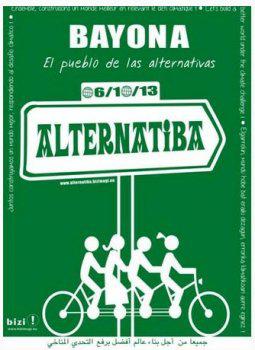
COP 21, the international summit on climate change, will be held at the end of 2015 in Paris, where all countries, including of course the major greenhouse-gas emitters, are supposed to commit to a last-chance, binding universal agreement on climate. COP 21 will not be able to ignore the IPCC report, Part II of which was released on March 31, its extremely alarming projections and its finding that no person and no corner of the globe will escape the devastation caused by global warming. This is the context in which Alternatiba was born, and the project intends to mobilize citizens throughout Europe to weigh on this decisive summit. It consists in setting up “Alternatiba Villages,” a festival of fairs, forums and (organic) feasts designed to show all the—concrete and possible—solutions to tackle the causes of climate change at both the local level and the global level. Alternatiba was launched in Bayonne (southwestern France, Basque country, hence its name, which means “alternative” in the Basque language) in October 2013. Its successful launch (see videos) mobilized more than 12,000 people and has so far spawned nearly 25 Alternatiba projects for 2014 and 2015 in France, Switzerland and Belgium. The movement relies on citizens to grow and spread, and everyone is asked to spread the word and participate in it, maybe even by organizing an Alternatiba Village in their town or region. For a world governance of climate: act locally - act globally.